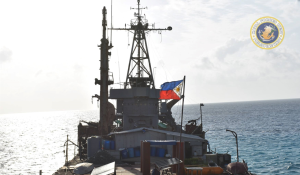The Philippine navy successfully transported food supplies to marines guarding a disputed shoal in the South China Sea on Tuesday, a week after China’s coast guard used water cannons to force the supply boats to turn back, sparking outrage and warnings from Manila, officials said.
Defense Secretary Delfin Lorenzana said the two wooden boats carrying navy personnel reached the marines stationed on a military ship at Second Thomas Shoal, called Ayungin Shoal by the Philippines, without any major incident. President Rodrigo Duterte expressed disgust on Monday in a regional summit led by Chinese President Xi Jinping over last week’s Chinese blockade of the supply boats.
However, Lorenzana said that while the Philippine navy personnel were unloading supplies from the boats, a Chinese coast guard ship deployed a rubber boat with three personnel who took pictures and video of the Filipino forces. “I have communicated to the Chinese ambassador that we consider these acts as a form of intimidation and harassment,” Lorenzana said.
He said the resupply boats reached the shoal without a Philippine military escort in accordance with a request by China’s ambassador to Manila, who assured him over the weekend that the boats would not be blocked again. But a Philippine military plane flew over as the supply boats arrived around noon at the remote shoal, which has been surrounded by Chinese surveillance ships in a years-long territorial standoff.
The Philippines says the shoal is in its internationally recognized exclusive economic zone, but China insists it has sovereignty over the waters and has the right to defend it.
Officials said the Philippine government conveyed its “outrage, condemnation and protest of the incident” to China after two Chinese coast guard ships blocked the two Filipino boats on November 16 and a third coast guard ship sprayed high-pressure streams of water on the boats, which were forced to abort their resupply mission.
Philippine Foreign Secretary Teodoro Locsin Jr. warned China that the supply boats are covered by a mutual defense treaty with the United States. Washington later said it was standing by the Philippines “in the face of this escalation that directly threatens regional peace and stability,” and reiterated “that an armed attack on Philippine public vessels in the South China Sea would invoke U.S. mutual defense commitments” under the 1951 U.S.-Philippines Mutual Defense Treaty.
Chinese Foreign Ministry spokesperson Zhao Lijian responded to the Philippine protests by saying that China’s coast guard had upheld Chinese sovereignty after the Philippine ships entered Chinese waters at night without permission.
Duterte, who has nurtured closer ties with China, did not comment on China’s action until Monday, when he raised the issue at a meeting of leaders of the Association of Southeast Asian Nations and China, using the Philippine name for the shoal.
“We abhor the recent event in the Ayungin Shoal and view with grave concern other similar developments,” Duterte said. “This does not speak well of the relations between our nations and our partnership.”
Xi did not respond directly to Duterte’s remarks but gave an assurance that China will not bully its smaller neighbors or seek dominance over Southeast Asia, diplomats said.
China’s increasingly assertive acts in the disputed waters have been protested by several rival claimants, including by the Philippines, Vietnam, Malaysia, and Indonesia.
It was the latest flareup in long-simmering disputes in the strategic waterway, where China, the Philippines, Vietnam, Malaysia, Brunei, and Taiwan have overlapping claims. China has transformed seven shoals into missile-protected island bases to cement its assertions, ratcheting up tensions.

































